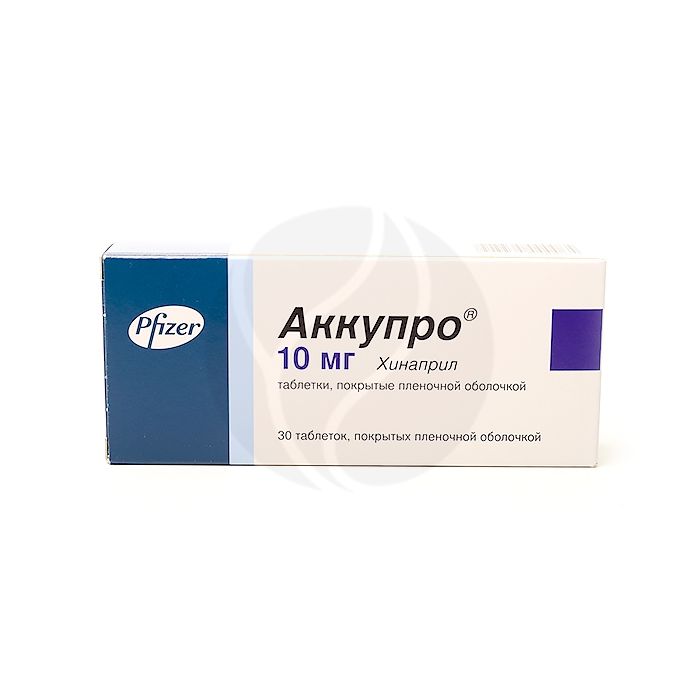Accupro tablets 10mg, No. 30
Expiration Date: 05/2027
Russian Pharmacy name:
Аккупро таблетки 10мг, №30
arterial hypertension (in monotherapy or in combination with thiazide diuretics and beta-blockers);
chronic heart failure (in combination with diuretics and / or cardiac glycosides).
Inside, without chewing, regardless of the time of the meal, with water.
Arterial hypertension
Monotherapy: the recommended initial dose of AkcuproЃ in patients not receiving diuretics is 10 mg once a day. Depending on the clinical effect, the dose can be increased (doubled) to a maintenance dose of 20 or 40 mg / day, which is usually administered in 1 or 2 doses. As a rule, the dose should be changed at intervals of 4 weeks. In most patients, the use of the drug AkcuproЃ 1 time per day allows you to achieve a stable therapeutic response. The maximum daily dose is 80 mg / day.
Combination with diuretics: the recommended initial dose of AkcuproЃ in patients who continue to take diuretics is 5 mg once a day; subsequently, it is increased (as indicated above) until the optimal therapeutic effect is achieved (see 'Interaction').
CHF
The recommended starting dose of AkcuproЃ is 5 mg 1 or 2 times a day.
After taking the drug, the patient should be under medical supervision in order to detect symptomatic arterial hypotension. If the initial dose of AkcuproЃ is well tolerated, it can be increased to 10Ц40 mg / day, divided into 2 doses.
Special patient groups
Impaired renal function. Taking into account clinical and pharmacokinetic data in patients with impaired renal function, the initial dose is recommended to be selected as follows: with Cl creatinine> 60 ml / min, the recommended initial dose is 10 mg; 30-60 ml / min - 5 mg, 10-30 ml / min - 2.5 mg (1/2 table. 5 mg each).
If the initial dose is well tolerated, then AkcuproЃ can be used 2 times a day. The dose of AkcuproЃ can be gradually increased, no more than 1 time per week, taking into account the clinical, hemodynamic effects, and renal function.
Elderly patients. The recommended initial dose is 10 mg once a day, then it is increased until the optimal therapeutic effect is achieved.
| Film-coated tablets | 1 tab. |
| active substance: | |
| quinapril hydrochloride | 5,416 mg |
| 10.832 mg | |
| 21.664 mg | |
| 43.328 mg | |
| (equivalent to 5, 10, 20, 40 mg of quinapril, respectively) | |
| excipients: magnesium carbonate - 46.584 / 93.168 / 125/250 mg; gelatin - 5/10/10/20 mg; lactose monohydrate - 38/76 / 33.336 / 66.672 mg; crospovidone - 4/8/8/16 mg; magnesium stearate - 1/2/2/4 mg | |
| film shell (for tablets of 5, 10 and 20 mg): Opadry white OY-S-7331 (hypromellose - 1.2 / 2.4 / 2.4 mg, hyprolose - 0.9 / 1.8 / 1.8 mg, titanium dioxide - 0.6 / 1.2 / 1.2 mg, macrogol 400 - 0.3 / 0.6 / 0.6 mg) - 3/6/6 mg; herbal wax - 0.05 / 0.1 / 0.1 mg | |
| film shell (for 40 mg tablets): Opadry brown Y-5-9020G (hypromellose - 4.8 mg, hyprolose - 3.6 mg, titanium dioxide - 1.368 mg, macrogol 400 - 1.2 mg, iron dye red oxide - 1.032 mg) - 12 mg; herbal wax - 0.2 mg |
hypersensitivity to any component of the drug;
a history of angioedema as a result of previous therapy with ACE inhibitors, hereditary and / or idiopathic angioedema;
simultaneous use with aliskiren and aliskiren-containing agents or with angiotensin II receptor antagonists (ARA II) or other drugs that inhibit RAAS (double blockade of RAAS) in the following conditions and diseases:
- diabetes mellitus with or without damage to target organs (diabetic nephropathy);
- impaired renal function (glomerular filtration rate (GFR) <60 ml / min / 1.73 m2);
- hyperkalemia (> 5 mmol / l);
- chronic heart failure and arterial hypertension;
lactase deficiency, lactose intolerance and glucose-galactose malabsorption syndrome;
pregnancy;
lactation period;
children's age (up to 18 years old).
With care: symptomatic arterial hypotension in patients who have previously taken diuretics and are on a diet with limited salt intake; severe heart failure in patients at high risk of arterial hypotension; conditions accompanied by a decrease in BCC (including vomiting and diarrhea); hyperkalemia; oppression of bone marrow hematopoiesis; aortic stenosis; insufficiency of cerebral circulation, coronary heart disease, coronary insufficiency (a sharp decrease in blood pressure during therapy with ACE inhibitors can worsen the course of these diseases); bilateral stenosis of the renal arteries or stenosis of an artery of a solitary kidney, a condition after kidney transplantation; impaired renal function in patients on hemodialysis (Cl creatinine less than 10 ml / min) (there is insufficient data on the use of Accupro in such patients);autoimmune systemic diseases of the connective tissue (including systemic lupus erythematosus, scleroderma); impaired liver function (especially when used concomitantly with diuretics); simultaneous use with potassium-sparing diuretics; diabetes; extensive surgery and general anesthesia; concomitant use of other antihypertensive drugs, as well as inhibitors of the enzymes mTOR and DPP-4.
'
